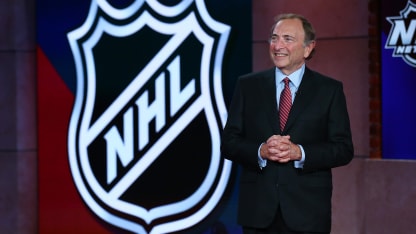The revenue bump is expected to trigger a $1 million increase in the NHL salary cap for next season, bringing it to $82.5 million.
"The business of the game has come back strong," NHL Commissioner Gary Bettman said Friday following the Board of Governors meeting.
Commissioner Bettman credited new revenue opportunities created with the NHL Players' Association, an example being advertisements on helmets, as well as new strong national partnership relationships and renewals as reasons for the spike in revenue.
He also said new media rights partnerships in the United States with the Walt Disney Co. (ESPN, ABC, ESPN+ and Hulu) and Warner Media (TNT) are off to a great start.
"Our partnership business is strong and vibrant and materially increased over where it was pre-pandemic," the Commissioner said. "Our partners and our new partners are showing great confidence in being associated with the game."
Commissioner Bettman said the revenue projections were off about $1 billion after the 2019-20 season was paused March 12, 2020, and the Stanley Cup Playoffs were played with no fans in Edmonton and Toronto hub cities. They were down $2.5 billion-$3 billion last season when the NHL played a shortened 56-game season primarily with no fans or a small percentage of them in arenas.
"I think it's fair to say all of our clubs got through this very well," the Commissioner said. "Our clubs are in good position; nobody is in jeopardy. I think the cooperation with the Players' Association, how our clubs work together with us made this all a reality. It's been a tough stretch, but I think, and I've been predicting this from the beginning, that we would emerge from this stronger, and we have, particularly with how vibrant the business of the game is."
Assuming continued annual revenue growth, the salary cap will continue to increase $1 million annually until the players pay the escrow debt they owe the NHL, which is expected to be completed by the end of the 2023-24 season.
The debt was incurred during the pause in the 2019-20 season, when hockey-related revenues (HRR) flatlined with players still being paid, thus giving them more than the 50 percent of HRR they are allotted under the terms of the NHL/NHLPA Collective Bargaining Agreement.
The players had 20 percent of their salaries withheld in escrow that went to the NHL last season. It is 17.1 percent this season and is expected to drop to 10 percent next season and to 6 percent the following three seasons.
"We could have recouped [the debt owed] it sooner but it would have required more from the players, so we smoothed it out," Commissioner Bettman said. "But our projections in that regard are holding pretty well, so the system is working as both it was intended and projected."
The Commissioner also said the Board of Governors approved an amendment to its ownership rules to allow private equity firms to buy limited ownership stakes in NHL teams. He said the Minnesota Wild and Tampa Bay Lightning were involved in approved transactions involving private equity firms.
"We have very strict rules, which very much limit what they can do, and their participation makes them extraordinarily passive, but it's an investment," Commissioner Bettman said. "The good news is they're showing great confidence in our game, in the business of our game and our growth prospects."

